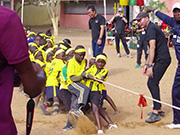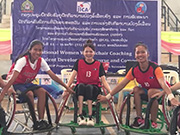International cooperation through “Sport” which is required now.

Sport is borderless, transcending language and cultural differences.
Sport has the power to attract people strongly. Sport brings fun, enthusiasm, and excitement. For some people, sport can even be a reason to live.
Moreover, sport also has the power to bring together people and regions with different cultural, religious, and linguistic backgrounds.
Participation in sports, which is familiar to us today, has long been regarded as a human right.
The United Nations Educational, Scientific and Cultural Organization (UNESCO) clearly states in the International Charter of Physical Education and Sport, adopted in 1978, that “The practice of physical education and sport is a fundamental right for all.”
Furthermore, in the twenty-first century, the 2030 Agenda for Sustainable Development, adopted in 2015, states, that "Sport is also an important enabler of sustainable development".
However, many developing regions don’t have the possibility to do sufficient project due to the lack of budget, human resources shortages, and the weak capacity of related organizations. Especially, the socially vulnerable such as people with disabilities and women have limited opportunity to take part in sport.
Meanwhile, Japan has the experience of making sport a common pleasure.
To “Promote Social Inclusion and Peace”, one of 3 pillars, we promote the participation of persons with disabilities and women in sport and peace building through sport.
For the above reasons, JICA considers sport as a development issue and has implemented projects leveraging Japan’s experience and strength in line with 3 pillars that are policies outlined in the JICA Global Agenda "Sport and Development”: 1. “Improve Access to Sport”, 2. “Development Human Resources”, 3. “Promote Social Inclusion and Peace”.
Therefore, we created JICA-Net multimedia-based learning material, “JICA initiatives in ‘Sport and Development’”(YouTube, external link) to promote the development of sport itself and the mainstreaming of utilization of sports as a mean of development.

To “Promote Social Inclusion and Peace”, one of 3 pillars, we promote the participation of persons with disabilities and women in sport and peace building through sport.
Introduce 5 examples of JICA’s initiatives.

A Japan Overseas Cooperation Volunteer who was dispatched to Burkina Faso promoted baseball.
The material firstly explains the outline of the JICA Global Agenda “Sport and Development”, and next, in line with the policies (3 pillars), it introduces representing examples of JICA’s initiatives in each pillar simply: Japan Overseas Cooperation Volunteers (JOCV) who worked respectively in Burkina Faso and Nepal, the training program introducing the principles and instruction methods of physical education at schools in Japan, first women-only athletic competition called “Ladies First” in Tanzania where women have limited opportunities to participate in sports, promotion of sports for parsons with disabilities in Laos to encourage their social participation, and a national sports event called “National Unity Day” in South Sudan to promote social cohesion and unity.
These approaches from various perspectives allows us to deepen the understanding of “Sport and Development”.
In creating the material, we included many examples and interviews with those involved so people can imagine what international cooperation through sports looks like.
Because we prepare the Japanese, English, French, and Spanish versions of the material, and have a full version (30 minutes long) and a digest version (5 minutes long) of each language, the material could be used in various occasions.
International Cooperation leveraging the strength and attraction of sport
To promote further international cooperation through sports, the material targets those who are involved and interested in “Sport and Development” in Japan and developing countries such as teachers and students studying sports, sports groups including governments, and those involved in sport-related projects.
We think that it could be used for pre-departure training of Japan Overseas Cooperation Volunteers (JOCV), which has dispatched a total of about 5,000 volunteers in the field of sports and physical education to 90 countries since 1965 when it began, and JICA Knowledge Co-Creation Programs.

Sport can be enjoyed in a variety of ways, not only by "playing" but also by "watching" and "supporting. It enables various activities to be done according to targeted regions and purposes.
Getting to interact and know each other through sport fosters mutual understanding and respect for diversity. It will bring the realization of a peaceful world.
Moreover, sport can be enjoyed in a variety of ways, not only by "playing" but also by "watching" and "supporting. It enables various activities to be done according to targeted regions and purposes.
We hope that the material will convey sport’s strength and attraction in international cooperation and contribute to creating a peaceful world where everyone can equally enjoy sport.
OGAWA Nao
JICA Secretariat of Japan Overseas Cooperation Volunteers
*The Material(s) mainly applied
JICA Initiatives in “Sport and Development”
This video shows representing examples in line with the policies outlined in the JICA Global Agenda "Sport and Development" and describes how sport can contribute to solving development issues.
This material is formulated for Japanese and developing countries' stakeholders involved in or interested in "Sport and Development" to provide them with an overview of the JICA Global Agenda and JICA's efforts to promote international cooperation through sport.




scroll